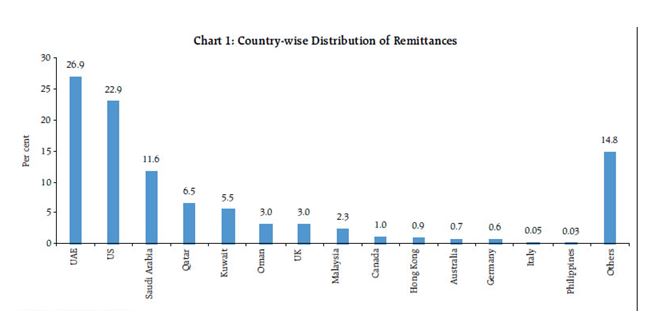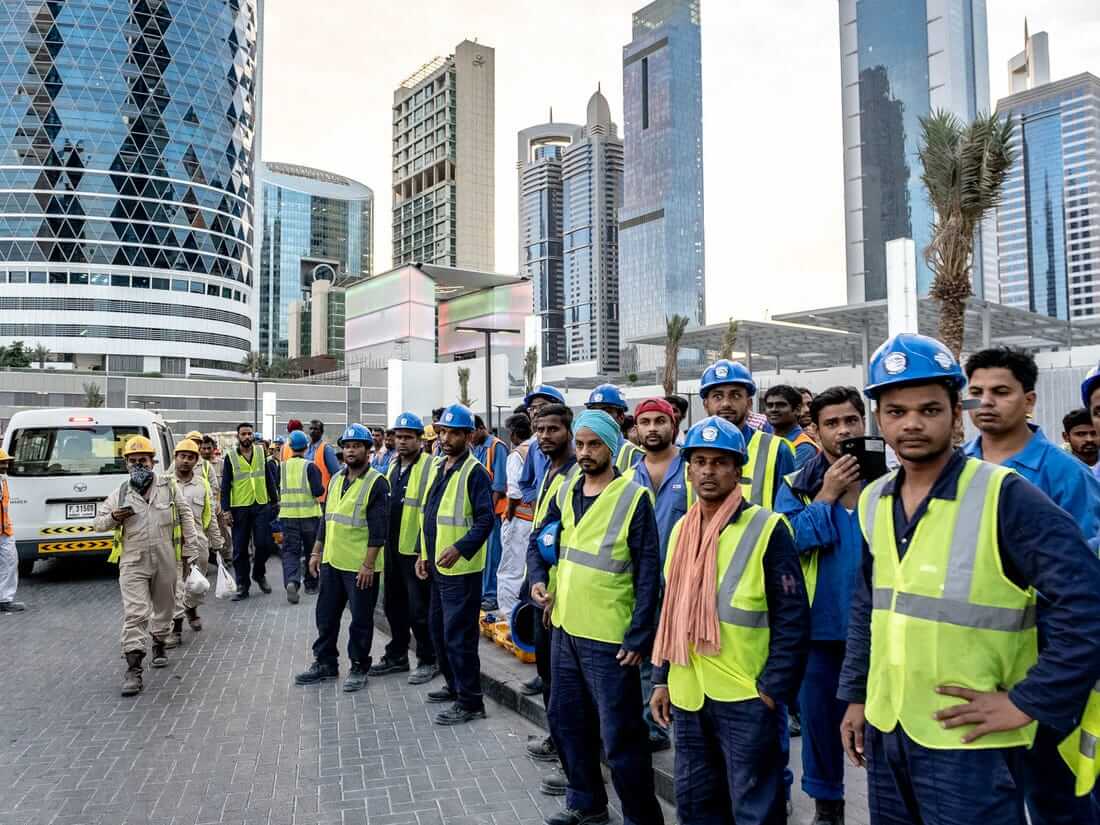Diaspora engagement has been an essential part of Prime Minister Narendra Modi’s foreign policy–from a landmark visit to Bahrain to the highly-publicized Howdy Modi event in the United States. He has been extremely proactive in garnering support from Indian businessmen and communities abroad. However, his government has simultaneously and conspicuously ignored the plight of migrant Indian workers in the Gulf.
As of 2018, home remittances sent by overseas Indians are estimated at a whopping $80 billion, making India the world’s highest receiver of inward remittances. The country-wise distribution of this is as follows:

Roughly 8.5 million overseas Indians currently reside in the six Gulf Cooperation Council (GCC) member states–Saudi Arabia, Oman, Bahrain, United Arab Emirates, Kuwait, and Qatar; they are among the highest remitting countries.
As of 2014, 70% of the Indian workforce in the Gulf was comprised of semi-skilled or unskilled workers, who have become indispensable to the resounding success of Gulf economies. The upcoming FIFA World Cup in Qatar and 2020 Expo in Dubai have also relied heavily on subcontinental labour. Despite their importance, India’s blue-collar workers face serious challenges to social security and labour rights in these countries.
The employment of most Indian workers in the Gulf happens within the kafala system, which has been heavily criticized by the International Labour Organization (ILO) for its violations of the Declaration on Fundamental Principles and Rights at Work, especially the rights to collective bargaining, freedom of association, and the elimination of all forms of forced labour. It also employs a legal framework that denies basic protections for unskilled migrant workers, and there is nothing stopping employers from witholding passports, delaying wages, and deporting workers without reason or notice. In October 2019, the Indian Ministry of External Affairs (MEA) reported 11,289 cases of non-payment of wages to Indian workers across the GCC countries.
Female domestic workers suffer the most from the lack of legal protection under the kafala system as they face widespread abuse in the forms of forced confinement; food deprivation; overworking; and physical, sexual, and psychological abuse in the homes of their employers. Many have had to pay their employers and agencies up to five times their wages just to let them leave, and are often forced to turn to sex work or other means to escape crippling debt traps.
For development project labourers, living conditions are crowded and dismal, and provide little respite and protection from the harsh desert climate. The roots of this abuse can also be traced back home, where agencies that recruit labour for Gulf companies have been found to collude with employers to mislead and mistreat illiterate workers.
Of the 6,014 migrant worker deaths reported by the MEA in 2018, 214 were due to Occupational Accidents, 421 have been reported as Suicides, and more than 4,000 cases have been attributed to “Natural Causes”. There is a severe lack of coverage on the underlying causes of these 4,000 deaths since the current reportage comes from diplomatic missions in regimes that thrive on censorship.
For decades, Indian governments have failed to properly respond to these challenges or engage in multilateral efforts that pressurize Gulf countries to improve their labour laws. Currently, the MEA has signed bilateral Memorandums of Understanding (MoUs) with each GCC country that provide institutional frameworks and Joint Working Groups to review and discuss labour issues.
Bilateral MoUs ensuring a Minimal Referral Wage for Indian migrant workers have also been signed, but the ILO has critiqued Indian missions for following a common specification to decide wages for different sectors in different countries and for deciding wages without any expert committee or stakeholder participation. India also has some of the highest referral wages in the GCC for low-skilled jobs–in Saudi Arabia, it was almost 40% higher than equivalent domestic wages. These protectionist measures deter firms from employing Indians, and non-fulfilment deters workers from migrating. There needs to be a more balanced approach.
The MEA has been closely involved in rescuing exploited workers once they reach out for help by reporting to Indian missions, Pravasi Bharatiya Kendras, tweeting to the Ministry, or using the MADAD portal. Indian Workers Resource Centres and shelter homes have also been built for distressed workers. To tackle illegal agents, the Government routinely shuts down reported defaulters and has permitted the overseas employment of only women through six designated State-run recruitment agencies.
In 2017, the Ministry also introduced the Pravasi Bharatiya Bima Yojana, a compulsory insurance scheme for all Emigration Check Required (ECR) workers migrating to ECR countries for work. Between 2014 and 2018, only 812 claims amounting to INR 6,335 lakhs have been settled; however, the number of settled claims seems highly disproportionate to the number of workers, and there are no additional statistics or information provided by the MEA on this either.
To ensure the safety of female domestic workers, the MEA has prohibited domestic sector employment of ECR women under 30, and requires foreign employers to pay a deposit $2500 to the Indian mission in case of direct recruitment. In 2017, Gulf Business reported that the bank guarantee requirement was lifted, but recent MEA reports state otherwise.
Further, most directly recruited female workers travel on ECNR passports and are not required to register before leaving the country, or are victim to agencies that send them on visit visas with the promise of later conversion. The eMigrate portal, which has been set up to gather data and act as a redressal mechanism for ECR domestic workers abroad, therefore excludes these women from its ambit.
These are not sustainable solutions since there are no solid State measures to ensure the social security of unskilled workers migrating across the Gulf corridor.
In comparison, the Philippines has adopted an effective social security strategy for its large overseas workforce. For instance, in the aftermath of the 2016 Saudi Oger incident, the Filipino government sent a delegation on priority to assess the needs and provide immediate financial assistance to its affected workers.
The Philippines’ 1997 Social Security Act provides a Social Security System (SSS) on a voluntary basis to migrant workers, which affords them two layers of social security protection. It includes a defined benefit insurance scheme that provides a basic pension based on a similar coverage programme for domestic workers and also has a defined contribution scheme, the SSS Flexi-Fund Program, which is a provident fund offered only to Filipino migrant workers.
The Filipino Overseas Workers Welfare Administration also provides compulsory social security for Overseas Filipino Workers (OFWs) who have been registered with the Philippine Overseas Employment Administration. It provides death and disability, burial, and healthcare benefits with a special emphasis on the needs of women. The Migrant Workers and Overseas Filipinos Act (1995) also has existing social and labour laws that protect the rights of migrant workers, tackle the issue of illegal recruitment, and impose heavy penalties on employers and agencies that flout these rules. It includes gender-sensitive provisions and highlights the need for such stratification.
Most recently, following the death of a domestic worker at the hands of employers, Rodrigo Duterte’s government has placed a temporary ban on the emigration of OFWs to Kuwait until justice is provided to the victim. Modi must take a leaf out of his handbook to take a sterner stance on the treatment of Indian workers abroad.
Delhi’s strategic significance for the GCC stems from their reliance on its large and brimming labour force. For India, this has resulted in crucial trade partnerships and energy imports. However, there remains a dire need for Modi’s government, which has been riding a wave of extreme diasporic engagement, to adequately protect blue-collar workers from exploitative foreign labour systems.
The Filipino model can be emulated to extend better State support while simultaneously applying pressure on the host countries to comply with these policies. The Indian government must take a more proactive stance towards this issue, and push for an eradication of the kafala system at the international level. Else, India will continue to profit from the heavy remittances sent from these countries while its workers suffer from their unscrupulous labour conditions.
Reference List
Ameerudheen, T. (2016). Workers stranded in Saudi: The Indian government could learn a thing or two from the Philippines. Retrieved 6 January 2020, from https://scroll.in/article/813060/workers-stranded-in-saudi-the-indian-government-could-learn-a-thing-or-two-from-the-philippines
Anand, K. (2015). 1,000 Indian Workers Dead. The Grim Reality Of Qatar's FIFA World Cup Dream. Retrieved 6 January 2020, from https://www.indiatimes.com/news/india/1000-indian-workers-dead-the-grim-reality-of-qatars-fifa-world-cup-dream-232718.html
Eller, D. (2019). How Indian Female Workers Are Being Trafficked To The Gulf. Retrieved 6 January 2020, from https://www.thequint.com/voices/women/indian-female-domestic-workers-migrants-labourers-gulf-countries-human-trafficking
Hilotin, J. (2018). Flexi Fund: For $3.73 per month, OFWs can start investing. Retrieved 6 January 2020, from https://gulfnews.com/how-to/your-money/flexi-fund-for-373-per-month-ofws-can-start-investing-1.2243221
Holzmann, R. (2016). Do Bilateral Social Security Agreements Deliver on the Portability of Pensions and Health Care Benefits? A Summary Policy Paper on Four Migration Corridors Between EU and Non-EU Member States. The Institute for the Study of Labor (IZA). Retrieved from http://ftp.iza.org/pp111.pdf
Kelly, A., & McIntyre, N. (2019). Workers at Dubai's Expo 2020 likely to have suffered dangerous heat stress. Retrieved 6 January 2020, from https://www.theguardian.com/global-development/2019/oct/03/workers-at-dubai-expo-2020-heat-stress
Lal, N. (2016). India’s Overseas Labor Pains. Retrieved 6 January 2020, from https://thediplomat.com/2016/06/indias-overseas-labor-pains/
MEA | Emigration Abroad for Employment. Retrieved 6 January 2020, from https://www.mea.gov.in/emigration-abroad-for-emp.htm
Migrant Forum in Asia. (2017). Policy Brief No. 2: Reform of the Kafala (Sponsorship) System. Quezon City: Migrant Forum in Asia Secretariat. Retrieved from https://www.ilo.org/dyn/migpractice/docs/132/PB2.pdf
Ministry of External Affairs. (2019). Question No.51 Death Of Indians Working In Gulf Countries. Ministry of External Affairs. Retrieved from https://www.mea.gov.in/rajya-sabha.htm?dtl/30998/question_no51_death_of_indians_working_in_gulf_countries
Ministry of External Affairs. (2019). Question No.51 Death Of Indians Working In Gulf Countries. Ministry of External Affairs. Retrieved from https://www.mea.gov.in/rajya-sabha.htm?dtl/30998/question_no51_death_of_indians_working_in_gulf_countries
Ministry of External Affairs. (2019). Question No.485 Pravasi Bhartiya Bima Yojana. Ministry of External Affairs. Retrieved from https://www.mea.gov.in/lok-sabha.htm?dtl/30982/question+no485+pravasi+bhartiya+bima+yojana
Ministry of External Affairs. (2019). Question No.1403 Non - Payment To Workers. Ministry of External Affairs. Retrieved from https://www.mea.gov.in/lok-sabha.htm?dtl/32101/question_no1403_non__payment_to_workers
Ministry of External Affairs. (2019). Question No.1584 Indian Domestic Helps Abroad. Ministry of External Affairs. Retrieved from https://www.mea.gov.in/lok-sabha.htm?dtl/32106/question_no1584_indian_domestic_helps_abroad
Ministry of External Affairs. (2019). Question No.3903 Workers Stuck Abroad. Ministry of External Affairs. Retrieved from https://www.mea.gov.in/lok-sabha.htm?dtl/32191/question_no3903_workers_stuck_abroad
Nayak, V. (2019). RTI reveal: More than 10 Indian workers died every day in Gulf countries in the last six years; 117 deaths for every US$ 117 remitted. Retrieved 6 January 2020, from https://www.humanrightsinitiative.org/blog/rti-reveal-more-than-10-indian-workers-died-every-day-in-gulf-countries-in-the-last-six-years-117-deaths-for-every-us-117-remitted-
Official Gazette, 1995-08-07, Vol. 91, No. 32, pp. 4994-5005. Migrant Workers and Overseas Filipinos Act of 1995 (No. 8042) (1995).
Olivier, M. (2017). Social Protection for Migrant Workers Abroad: Addressing the Deficit via Country-of-origin Unilateral Measures?. Retrieved 6 January 2020, from https://publications.iom.int/system/files/pdf/social_protection.pdf
Pethiyagoda, K. (2017). Supporting Indian workers in the Gulf: What Delhi can do. Retrieved 6 January 2020, from https://www.brookings.edu/research/supporting-indian-workers-in-the-gulf-what-delhi-can-do/
Philippines domestic workers banned from going to Kuwait. (2020). Retrieved 6 January 2020, from https://gulfnews.com/world/asia/philippines/philippines-domestic-workers-banned-from-going-to-kuwait-1.1578037461045
PM Modi conferred with top Bahraini award. (2019). Retrieved 6 January 2020, from https://www.livemint.com/news/india/pm-modi-conferred-with-top-bahraini-award-1566737016736.html
Reserve Bank of India. (2018). Globalising People: India’s Inward Remittances. Reserve Bank of India. Retrieved from https://www.rbi.org.in/scripts/BS_ViewBulletin.aspx?Id=17882
Sasikumar, S., & Sharma, S. (2016). Minimum Referral Wages for International Migrant Workers from India: An Assessment. International Labour Organization. Retrieved from https://www.ilo.org/wcmsp5/groups/public/---asia/---ro-bangkok/---sro-new_delhi/documents/publication/wcms_538168.pdf
Shrinivasan, R. (2019). India was the top recipient of remittances worldwide in 2018. Retrieved 6 January 2020, from https://economictimes.indiatimes.com/nri/forex-and-remittance/india-was-the-top-recipient-of-remittances-worldwide-in-2018/articleshow/70310386.cms?from=mdr
Writer, S. (2017). India ends $2,500 bank guarantee requirement for GCC maid recruitment. Retrieved 6 January 2020, from https://gulfbusiness.com/india-ends-2500-bank-guarantee-requirement-maid-recruitment-gulf/
Image Source: Business Insider

